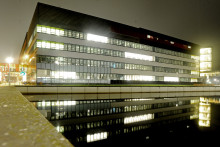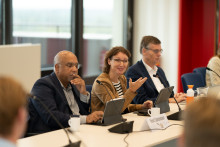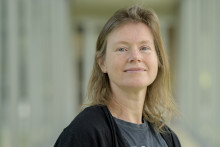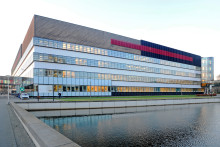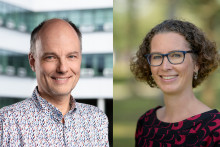‘The day you knew was coming.’ This is the primary response of Wander Kenter, member of the Faculty Council and Manager Business Partnerships & Business Development at the TechMed Centre. The e-mail sent by the Faculty Board on 6 September made an impression, but did not come as a bolt from the blue for Kenter. 'It's not nice, especially for colleagues who already knew because of the previous measures that they won't get a contract extension, for example. But we now know that it's going to affect a lot more of us, and that isn’t nice for anyone.'
'No surprise'
The email made a similar impression on Associate Professor Saskia Lindhoud, Professor David Fernandez Rivas and Sebastiaan Waanders, Head of TechMed Infra. ‘Of course this is bad news. But if you're well-informed enough, this can't have come as a surprise,' says Waanders. 'Within our department, it was no surprise that a formal reorganisation was announced, we had seen this coming for a long time. Actually, this was already pre-announced during a session in July,’ says Lindhoud.
Fernandez Rivas sees two developments coinciding. ‘The UT needed a moment to restructure and increase the transparency of its finances. On the other hand, the new governmental plans add pressure, given the implications for individuals and the different organizational units.’
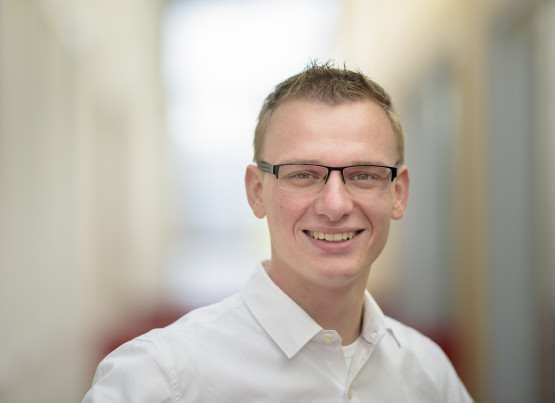
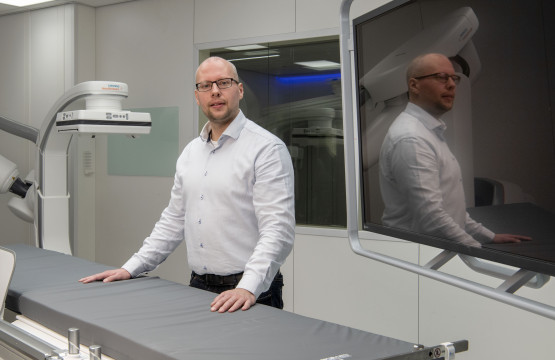
Wander Kenter and Sebastiaan Waanders.
'Cynicism and sometimes panic'
During a session on 24 September, the Faculty Board wants to provide more clarity about the size of the reorganisation and how it should be carried out. Are things already being anticipated in the workplace? 'As a team, we have taken a good look at the 'need to have's' versus the 'nice to have's'. What measures can we take to reduce costs, control workload and still be able to continue to perform our core task properly?', says Waanders, who states that expectation management plays a vital role in these financially difficult times. 'Measures have consequences, and sometimes for us that means that the quality of our services decreases. That's close to our hearts, but we're clear about it to our end users.'
'I notice that I really want to put my shoulders to the wheel. For example, by ensuring that we raise more external funding through subsidies and companies,' says Kenter. Yet he also sees a different tenor around him. 'I see that cynicism and sometimes panic creeps into the organisation. All very understandable reactions and emotions, but I'm a go-getter so that doesn't bother me as much. Above all, I hope that sharp choices will be made soon; what are we going to do and what are we not going to do? So that we can invest and grow again in the themes that are important to us as a faculty and university.'
'Vision needed'
But Lindhoud wonders aloud which themes are important and whether there is enough underlying vision to support them. 'As people, I really appreciate our faculty board, but as administrators I expected more from them. At faculty level, a vision of research and education is very important. The sector plan funds offered an enormous opportunity to formulate a strong vision and to align personnel policy accordingly, both in the field of research, but also in particular in the field of education. We are training the people who are responsible for ensuring that we meet the Paris Accords. This requires a vision. During the walk-in meeting on 16 July, the dean mentioned that it must be determined 'what is nice to have and what is essential to have'. How can you do this without a vision?'
Personal dramas
Lindhoud anticipates a reorganisation that coincides with the formation of departments within the faculty. 'A very undesirable scenario would be that the new departmental boards would be given the task of carrying out the reorganisation at departmental level. I think this is the job of the Faculty Board. The department's task is to keep the atmosphere as good as possible, to guarantee social safety and to represent the interests of the employees in the department. Whatever this reorganization is going to be, in the end it will all be personal dramas. That's what worries me.'
Waanders says he understands the route that Science & Technology is now taking. 'But I hope that we at UT dare to make choices that don't throw the baby out with the bathwater. Take the situation surrounding student assistants, for example: this cutback seems primarily financially driven, but it really touches on the DNA of the UT: working together with our students to keep the organisation running. Our student employees are really our unique selling point. We can't just give that up because it's the 'easiest' cut. On paper, that is...'
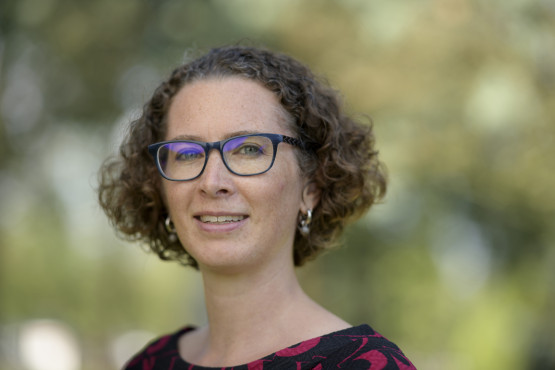
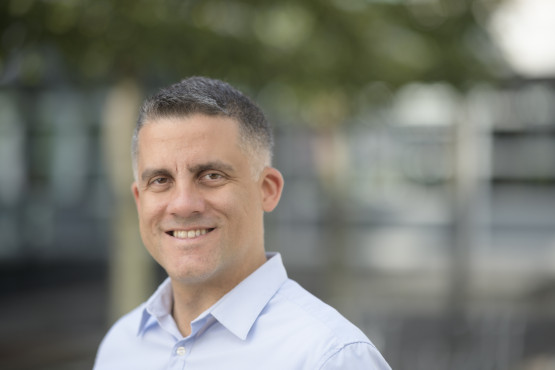
Saskia Lindhoud and David Fernandez Rivas.
'We're not going to make it with minor measures’
What way forward do they see? Fernandez Rivas is optimistic. ‘I am confident that we can get out of this situation working together. In the engineering context, finding inefficiencies in a system, or balancing personnel from some functions to others does not need to be painful.’ Waanders is less optimistic. 'It's really going to hurt, it's going to affect people, but we're not going to make it with only minor measures. We really won't come out of this stronger, but we can look at where we can organise and arrange things better.'
‘It's clear that something has to be done,’ says Lindhoud. 'I hope that the right, well-reasoned choices will be made, so that we will come out stronger in the long term. This is important for Science & Technology, the UT, but also for the region.'
And it is precisely that region that should be sought out, according to Fernandez Rivas. ‘If other citizens outside the academic 'bubble' had enough information and examples about the great work we do, they would join us in the quest to defend the need for the budget. This budget is required to provide education, conduct research and valorise our scientific knowledge with world-class excellence. We have to take care of the people we have at the UT; It took years of effort and economic resources to build the wonderful university we have.'
Still, that times will be though, that much is now clear, Kenter concludes. 'Unless we come across a nice bequest of a few million from some very rich alumni, I think this is the only way forward.'


